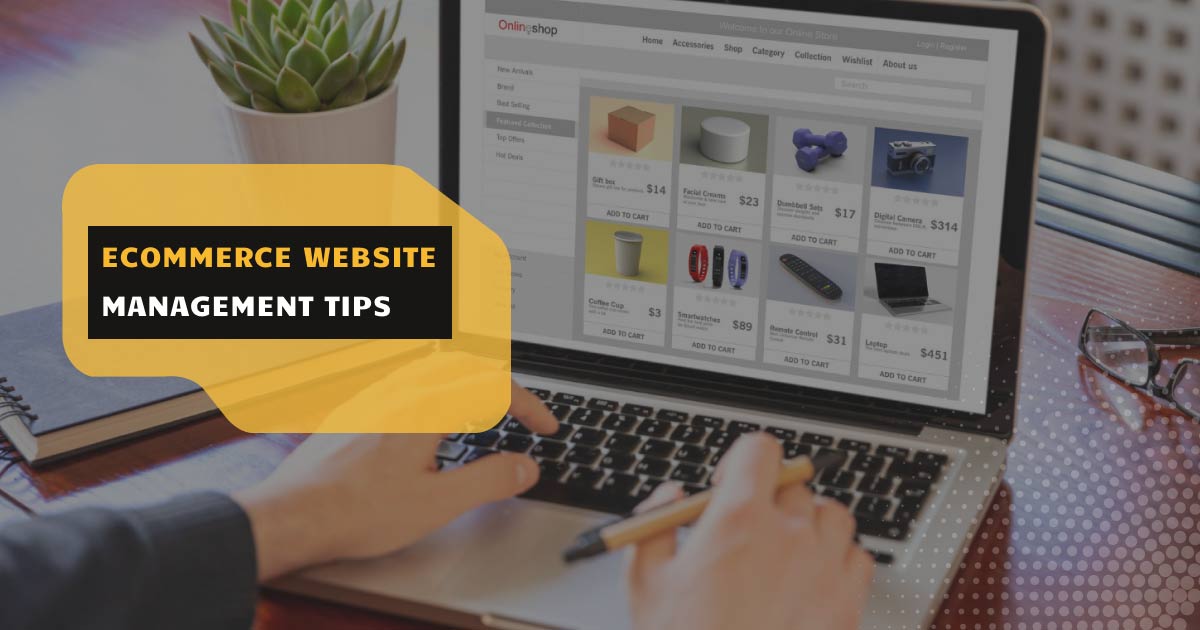Statista states that in 2023, online retail sales will reach up to $6.51 trillion whereas ecommerce websites take up to 22.3%. That means to achieve success like a multinational such as Amazon, knowing the ins and outs of ecommerce website management is the only solution.
You might have an idea about: what is an ecommerce website and how ecommerce sites work. But searching for a way how to make your ecommerce website popular?
In this article, we’ve highlighted 12 ecommerce website tips that will jump-start your sales.
What is Ecommerce Website Management?
Ecommerce website management refers to all your online business or store processes. From customizing and developing your e-commerce site to customer management, inventory, shipping, fulfillment, and other systems. The management website for ecommerce offers a business plan and strategic direction and tracks details of day-to-day site activity.
In short, ecommerce store management or site management tasks refer to:
- Develop and retain a consistent brand identity
- Ensure the top-selling products and services that add benefits
- Discover the ecommerce site’s target audience to meet consumers’ expectations
- Make workflows easier
- Develop marketing ideas and concepts to attract more traffic
- Multi-sales channels (Dropshipping)
- And many others.
However, to achieve your online business goals, like converting visitors into regular customers, this web management for business also ensures:
- Product Quality
- Customer Acquisition
- Customer Retention
- Growth
To reach customers’ doorsteps or become a top brand, website, or online store’s design and development is not the end task. Up-to-date monitoring, analyzing, structuring, and updating help you keep pace with competitors.
You might be thinking: Is it necessary to hire an ecommerce manager to manage ecommerce website? To get your answer let’s look at why you need to manage ecommerce website first.
Why is Ecommerce Management Important?
Your ecommerce website isn’t a one-off creation or a perfect fit that doesn’t need to maintain. As an entrepreneur or ecommerce business owner, you aim to move your product from the shopping cart to the shoppers’ doorstep. But despite having an online store and trendy products, you rarely achieve your goals.
Why?
Just like running a physical store, you need to organize and monitor any number of moving pieces as an online retailer. Below we’ve enlisted some specific advantages of ecommerce management solutions.
Help to build your marketing strategy
Using insights about what are customers’ demands, like what your customers are purchasing, who you target, and what they want from your service or brand, you can build a personalized marketing strategy.
This way, you achieve your marketing goal and brainstorm a unique business plan.
Ensure secure customer data
In this digitalization world, knowing your consumers is not enough at the channel level. The most valuable asset is keeping their data secure, which grows loyalty and trust.
At the same time, you’ll have a more accurate view of how and why your customers rely on you to shop and buy.
Help to maintain inventory level
Suppose, you have multiple sales channels or warehouse locations. In that case, the visibility of your inventory becomes a handy task to deal with. You may risk overselling or losing product tracking sequences if your systems aren’t integrated well.
With ecommerce management, you can sync your inventory across channels and gain complete real-time visibility.
Help to track and monitor performance
The management solution helps to analyze user interaction and track the overall performance of your ecommerce store.
You can also monitor the progress against KPIs (Key performance indicators), including:
- Site visits
- Customer retention rate
- Average order placement
- And many others
Improve productivity and earn revenues
As a small business owner or an established one, a deep understanding of ecommerce business data can add profit to your sales margin.
Here, management tools and software help to simplify and automate administrative tasks that are informed, targeted, and effective.
Help expand to other sales channels
After ensuring a well-performed inventory, marketing, and advertising efforts, you can expand your business to other sales channels, like Amazon.
Also, without re-entering data, the ecommerce management can connect your inventory and product listings directly to those channels. In that way, you can effectively expand your business.
Help to maximize revenue
You can make data-driven decisions using segmentation, personalization technique, or integrated apps, like where you need to spend your time and money.
With the right ecommerce management strategies, you can maximize revenue through targeted adjustments.
Boosts retention
Retention is an important metric for ecommerce businesses – especially for subscription-based pricing model businesses or services. Using a combination of strategies, like loyalty programs, targeted emails, increasing customer retention, or boosting ROI, ecommerce management solutions help you a lot.
Also, it ensures that every customer experiences stress-free service.
Are you wondering why it is considered a long-term investment in your marketing sales funnel? And how to make your ecommerce website popular?
12 Tips on E-commerce Website Management
A study from Forbes shows that the global ecommerce market will gain a total of $6.3 trillion in 2023, which indicates a vast marketplace.
Here, top-performing ecommerce sites win the game by grabbing more consumers' attention.
How?
The answer is: by providing a stellar customer experience from start to end. Now the question may arise: how to manage ecommerce business to achieve more revenue and targeted traffic? Where do you begin to set the best-performing ecommerce sites?
Here, we've enlisted 12 expert-level tips and tricks to enrich your sales.
Let's get started!
1. Target Your niche audience
To keep an ecommerce business or online store profitable, you need to focus on your niche audience rather than a broad audience in the search engines. From small to big, every business's 1st priority is identifying targeted audiences' pain points and interests.
Do a little research and find out what types of businesses are booming nowadays. In that way, you can make your product unique and market-friendly. This strategy helps you to build customer loyalty and increase the repeat customer ratio.
Pro Tip: SEO tools like Ahrefs or Semrush help build a strong marketing strategy based on your marketing insights.
2. Make sure your site is responsive (page speed optimization)
If your business site isn’t compatible with all devices (smartphones, tablets, and computers) and is not cross-browser friendly, or has poor UI, you’re losing potential customers. That’s why responsive web design is getting so savvy to boost sales and attract more consumers.
Also, the device-friendly site offers you higher page speed during loading or scrolling. If you want to turn off some elements for mobile phone users, you can easily do it with a single click.
3. Implement SEO for profitable outcomes
Who doesn’t want to rank top in the search engine result pages (SERPs)? To get users organically, SEO is the best and undefeatable trick for entrepreneurs, small, or established business owners.
Here are key SEO strategy-focused elements that improve visibility and drive sales:
- Product-focused keywords. for this, you can use keyword research tools.
- Unique & convincing descriptions. compelling product descriptions and information with call-to-action (CTA) encourage more consumers.
- Backlinks. to prove your business site is authentic and reliable, backlinks are a must thing.
Pro Tip: For high-quality content for your ecommerce website, you can hire Ecommerce content management service provider. In the meantime, you can earn popular backlinks through guest blogs.
4. Improve UX & UI for easy navigation
Online business success lies in how smooth and effective features you include in your site to give customers distraction-free and easy navigation. You don't want your visitors to have a hard time clicking eight different buttons to go from A. process to B. This distracts the audience more.
So to give users a clean and effective browsing experience, you can choose easy-to-read fonts, important features, breadcrumbs, and many others.
However, to align your navigation with your user goals, try to create unique user scenarios.
5. Priority on high-resolution product images
As per statistics, 81% of consumers rely on product photos before confirming a purchase. High-resolution product images are one of the most useful things that give users a realistic experience.
So, create a story-driven product view that emotionally engages audiences and results in better sales performance.
Also, it can help you to differentiate from your competitors and build desirability. Use customer and competitor research to present your products more appealingly. You can build your product story without any words and give users positive vibes.
6. Maintain your inventory levels
Ecommerce inventory management systems help you to avoid unnecessary hassles and extra costs.
Also, to be on top of competitors, it offers more flexibility, efficiency, and profitable ways by streamlining:
- Categories. Help to group your inventory based on the item value, frequency of sale, and sell products.
- Audit. Schedule regular inventory audits to reduce products' mis-shipping, stocks, and so on.
- Track. If you’re selling perishables items, it offers “first-in, first-out” ways.
- Dropshipping. To cut down labor or warehouse costs, you can apply this process for more profits.
7. Keep track of ecommerce orders
Ecommerce order management (OMS) begins with customer purchase to shipment. It is the back-end process that manages and helps to fulfill online orders. The process keeps track of every sequence like picked, packed, and shipped to its recipient.
If you have multi-order channels, it manages the business processes around fulfillment by reducing human error and extra time. Using Veeqo, pulse commerce, and others OMS software helps you to achieve your goal. Or, you can hire experts to manage your orders from your marketplace.
8. Add secure & easy payment gateway
Secure and easy payment options are one of the most important parts of the ecommerce website management system. A seamless payment process allows users to go with an easy sale.
Whether it's by credit card. PayPal, or other options, pay attention it should not give users complicated and long procedures to fulfill the payment.
On the other hand, you can offer multiple; yet secure card options. For this, research your targeted audiences' accessibility options which they prefer most.
9. Integrate your e-store with affiliate marketing
Do you want to increase sales and revenues from your ecommerce management services? Affiliate marketing can help you to earn new customers for your website.
Also, when people click on your affiliate links or make a purchase, you can earn commissions. From boosting your sales to growing your business, this marketing greatly helps you.
To integrate your e-store with affiliate programs, you can choose affiliate management apps, like UpPromote, or try influencer marketing. However, you can join affiliate networks like ShareASale or others to establish millions of visitor pipelines to your e-store.
10. Focus on social media integration
Invest in social media marketing to reach niche audiences and drive more traffic from other sources. Make sure your ecommerce social media strategy maintains privacy and transparency.
You can achieve multiple objectives, like:
- Build brand awareness
- Allow advertising through Facebook or Instagram
- Open selling path directly
- Provide better customer service
- Build new audiences connection, and so on
You can use social media analytics to generate digital marketing campaigns. Also, you can entice audiences by uploading trendy products. Place social sharing icons in CTA.
11. Explore the right sales channels
Now it's time to explore the right or new sales channels to grab the attention of targeted audiences. If your business model's focus point is to broaden sales channels, you can try Amazon, eBay, social media, affiliate marketing, and others.
Remember to keep an eye open for consumer preferences. However, you can manage your sales process using sales CRM tools by integrating with others. You can conduct with experts to figure out which one is best for your target consumers.
12. Measure & analyze for business growth
Data is the core thing to reach your targeted ecommerce management business goal. From website performance to customer engagement, sales, and other things, you need to analyze. For tracking all jobs, you can use different analytics tools like Google Analytics, Shopify analytics, etc.
However, these tools allow you to identify trends, optimize your online store's maximum performance, reach or new traffic, and many other business factors. With these analytics reports, you can discover new opportunities and quickly address upcoming problems.
Bonus Tip: Create a chatbot & offer a discount
Do you want to deliver a great shopping experience to satisfy your customers? You can try personalized communication to introduce them to the latest offerings. Or, you can consider an AI-powered chatbot on your website that take your customer service to the next level.
You might be wondering thinking: How to choose the best ecommerce platform to fulfill your site needs? Or, searching for expert helps to manage your ecommerce store?
To get expert help managing your online store, go through the next section!
How the RankUpper Helps with Ecommerce Website Management?
Do you recently build an ecommerce website? Or, searching for the best website management companies to add more profit to your sales channels?
RankUpper is the most renowned ecommerce management company with in-house SEO professionals, web design, and development experts. With us, you get different ecommerce management solutions that fit all sizes of business goals. From integrating your ecommerce platform to setting up your fulfillment logistics,
We offer different ecommerce website management services, including:
Ecommerce store management
Different types of ecommerce websites for online business require different store setups, including Shopify, Amazon, WooCommerce, eBay, Etsy, etc.
If you want a trouble-free store setup to boost your brand reputation to your consumers or pocket more sales, we provide different store management solutions, including:
- Website creation
- Store setup & configuration
- Theme design,
- Ecommerce content management services
- Product listing & categories
- Competitor analysis
- Store ads management & promotion
- FBA setup & management (For Amazon store)
- Users update & data manipulations
- SEO optimization, and so on.
Inventory management
Our expert ecommerce web manager helps you to track stock levels and the goods movement (deliver raw materials to manufacturers or fulfill orders for finished ones) through the supply chain.
For this, we follow different techniques, including:
- Demand forecasting & planning
- Track all product information
- Audit your inventory
- Analyze supplier performance
- Track sales
- Measure safety stock & reorder points
- And many others.
However, ultimately, our goal is to reduce business risks, like mis-shipments, shortages, out-of-stocks, spoilage, overstocks, mis-picks, and many others. Overall, it helps your online businesses to minimize costs, ensure longevity, and boost profitability.
Note: Inventory management solutions vary on business goals and types. Looking for an in-depth detail of Shopify Inventory Management – Everything You Need to Know? Check out this article!
Ecommerce order management
Do you want to track the entire online store’s order fulfillment process at each stage? From data collection to customer orders, all processes are handled perfectly.
And for this, we monitor, trace, and control several activities, including:
- Consumer communication
- Multiple channels sales
- Tack supply chains
- Pay attention to logistics and third-party logistics (3PL)
- And many others
Tip: Check out this article for Shopify Order Management: An Ultimate Guide with 7 Best Apps here!
To stay competitive, fulfill brand trends, and be scalable.
Shipping management
Ecommerce shipping management relates to several activities, including:
- Picking and packing from the warehouse or other retailers
- Processing and receiving
- Managing returns, and others
We provide an automated and streamlined way by using the latest shipping software so that you can track ship orders and run hassle-free business in all steps, like:
- Which regions you’ll deliver
- Delivery options and shipping requirements
- Free shipping offers, and many others.
In that way, you get enough time to focus on your business. Also, you don’t need to worry about errors.
Customer management & personalization
Do you want to reach a certain scale? Or, have a business model with a long sales cycle?
RankUpper ecommerce CRM (customer relationship management) delivers more effective ecommerce marketing strategies, including:
- Conversion rates,
- Consumer click-through rate,
- Which products appeal to them most, and many others.
By this, you can maintain and organize the consistency that builds long-term client or buyer relationships.
On the other hand, to build loyalty and help you with one-to-one personalization, our experts collect customer data, including:
- Consumer’s precious purchases,
- Browsing behavior
- Geographic location, and many others.
Segmentation
Market segmentation is also known as target demographics. To evaluate and categorize target consumer groups, improve marketing efforts, and offer the best products, every size of business undergoes this factor.
Using Google Analytics or other technologies, our experts find out several customer and marketing segmentation, including:
- How many sales you made yesterday
- Browning behavior of the customer
- Interests
- Device options
- Gender
- And many others.
All these criteria help you to get more personal and profitable sales. Also, it helps to empower online stores to deliver customers’ favorite products.
Lead scoring opportunities
You must have an idea about lead scoring in business-to-business (B2B), business-to-consumer (B2C), and online businesses. The term is mainly used in long sales cycles and with many stakeholders. To achieve higher score qualification rates or investment targets, they utilize it to identify what matters most.
However, our in-house experts help you track all leads and identify the most loyal customers based on customer actions.
For example, did they purchase your product? Or are they on your email subscription lists? All reports help to make a decision on re-engaging with a past customer or lead.
FAQs Regarding Ecommerce Website Management
What is an ecommerce CMS?
Content management system (CMS) is a software that allows ecommerce shop owners or users to create, modify, and publish digital website content without any prior coding knowledge. And an ecommerce CMS enables digital merchants to manage content on their online stores with easy-to-use editors.
Note: Anyone can change the product page layout, add promotional banners, or new sections.
What are the best ecommerce CMS platforms?
Below we've enlisted the most popular and top ecommerce CMS platforms that are used among online businesses.
BigCommerce. is one of the most popular ecommerce platforms that supports all types and sizes of merchants (over 60,000). Built-in features, CMS capabilities, advanced SEO integration, flexible APIs, and many other features are available.
Shopify. is one of the world's well-known SaaS ecommerce platforms. Its simple interface, separate POS system, free store templates, and affordable pricing suit startup merchants and small businesses.
WooCommerce. is known as a popular ecommerce plugin for WordPress for its user-friendly interface, sophisticated features, plugins, themes, and customization. You can experience secure payments, shipping integration, and many others.
OpenCart. is another free and multifunctional ecommerce content management system. It offers diverse templates, plugins, payment gateways, shipping methods, and others.
Magento. is a popular open-source ecommerce CMS solution owned by Adobe. It offers rich functionality and integration, like CRM, ERP, chatbots, and other enterprise-level software.
How much does it cost to manage an ecommerce website?
The ecommerce website management costs depend on several factors, including data backups, inventory, security, ecommerce SEO, shipping, product or email marketing, and other management tasks. So, it is ideal to consult with renowned ecommerce service providers which you choose to manage your site.
How can I be a good ecommerce manager?
To be a good ecommerce manager, you need dedication and sound knowledge of web design and development capabilities to manage or create user-friendly interfaces. They are involved with marketing, advertising, and content teams.
That's why to be a small business web manager or established one you need:
● Attention to detail.
● Decision-making abilities to avoid loss and earn profit.
● Up-to-date market research skills to acknowledge your target market and their needs.
● Collaboration and team-building skills.
● Sound customer service skills.
● Critical thinking and expert problem-solver abilities.
● Leadership skills.
How can I improve my ecommerce skills to run a successful online business?
There are lots of moving parts in online businesses, and to ensure that you are on the right path, here's a quick overview of must-have ecommerce skills:
● Content for Ecommerce Website. to speak customer language and promote the product's uniqueness.
● Marketing & Advertising. deciding which marketing and advertising channels suit your business goal.
● Testing & Data Collection. how long the web pages were viewed, what are top-selling products, what is website loading time, and many other factors need to analyze.
● Data Analytics. for monitoring resorts from store sales and performance points of customers' view.
● Ecommerce Business Law. To avoid unnecessary issues, pay attention to shipping restrictions, trademarks, patents, copyrights, customer privacy, and many other laws.
● Site Design & Development. to run a smooth and user-centric online business.
● Search Engine Optimization (SEO). to appear higher in the search engine rankings and inform people about your brand, products, or offerings.
What are ecommerce revenue models?
The revenue model is an income-generating framework. At the same time, Ecommerce revenue model refers to a plan for generating revenues from an online business. However, it helps to structure your ecommerce business and offer diverse methods of generating successful sales.
What is the role of ecommerce manager?
Generally, ecommerce managers are responsible for online sales of the company or brand they are working with. Let's take a look at more details below:
● Manage all online activities, like traffic acquisition, sales, conversion, reporting, and testing.
● Create frameworks for transforming social media sites into highly profitable platforms.
● Develop and implement ecommerce strategies to improve website performance and re-platforming website to new CMS.
● Work with developers and digital marketers to deliver top performance and achieve KPIs.
● Review legal and copy disclaimers to ensure accuracy.
● Examine and analyze traffic, sales-related metrics, and other marketing strategies.
● Create promotional offers if needed.
● And many other insight activities to achieve the company's targeted goal.
Final Thought
Ecommerce website management can be a difficult task, but if you follow these trendy tips, you will fuel your business growth.
So, go ahead and beat the competition by building a successful brand identity.





